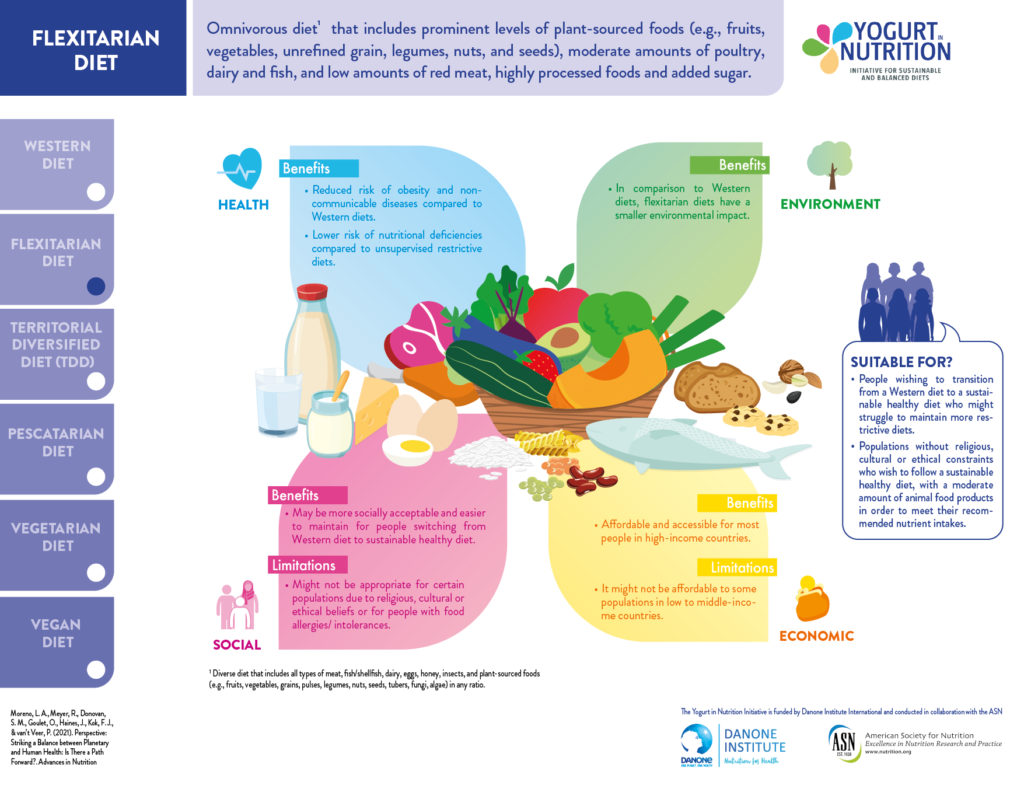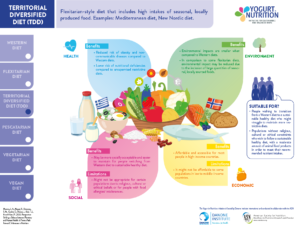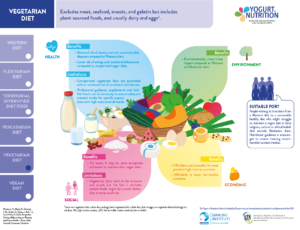The adoption of healthy, sustainable diets can help reduce the risk of diseases related to malnutrition, while protecting the health of the planet. Four pillars are defining the healthy and sustainable diets: health and nutrition, affordability, cultural acceptability (ethical and religious) and environment (Sustainable healthy diets guiding principles, FAO/WHO). Taking those pilars in account, which diets can we adopt and what benefits do they provide?
Go for a more plant-based diet
With the increase of the global world population, meat-protein consumption is expected to increase by 14% by 2030. As for global meat production, it is expected to increase by nearly 44 million tons in 2030, reaching 373 million tons (1). One way to promote more sustainable agriculture and food systems is to reduce meat consumption, especially red and processed meat. In addition to reduce the carbon footprint associated with beef production, there are health benefits associated with shifting the balance between animal and plant products. In this dynamic, more fruits, vegetables, legumes and nuts are recommended (2) and several sustainable diets can be considered.
Flexitarian diet or flexitarism
Flexitarianism is a combination of “flexible” and “vegetarianism”. This diet is primarily plant-based and includes the consumption of small amounts of animal-based products (4).
It is defined by:
- High amount of plant-based foods (fruits, vegetables, unrefined grains, legumes, nuts and seeds),
- Moderate amounts of poultry, dairy and fish
- Low amount (1 serving/week) of red meat, highly processed foods and added sugars.
This diet is ideal to change progressively from a Western-style diet to a more sustainable healthy diet. It is easy to follow for populations without religious, cultural or ethical constraints and who want to follow a healthy, sustainable diet with a moderate amount of animal-based food products in order to meet the recommended nutritional intake.
 The flexitarian diet favors diversity rather than restriction, and is part of a sustainable dynamic.
The flexitarian diet favors diversity rather than restriction, and is part of a sustainable dynamic.
From a nutritional standpoint, the richness of plant-based foods, combined with the consumption of dairy products and a reduced amount of meat, provides a healthy and complete blend of high-quality proteins, fiber, vitamins, minerals and fatty acids (5).
Planeterranean diet or Territorial diets
Some local or territorial diets (Territorial Diversified Diets – TDDs), such as the Mediterranean diet or the New Nordic diet, have been shown to contribute positively to human and environmental health. These are flexitarian diets that include a high consumption of locally produced seasonal foods, moderate amounts of animal protein, with fish and dairy products and limited processed foods (4).
This diet would contribute to fight against long-term diseases such as type 2 diabetes, certain cancers and cardiovascular diseases, which are responsible for more than 70% of deaths in the world.
The traditional Mediterranean diet includes a wide range of minimally processed plant foods that are rich in fiber and full of vitamins, minerals and phytochemicals. The low intake of fish, meat, eggs and cheese provides other essential nutrients, such as vitamin B12, that are lacking in an exclusively plant-based diet. Studies suggest that it is associated with a reduced risk of developing multiple chronic diseases and increased life expectancy. The beneficial effects are associated with the prevention of cardiovascular disease, type 2 diabetes, atrial fibrillation and breast cancer(6).
However, the Mediterranean diet is mostly suitable for the inhabitants of the Mediterranean basin, the same cannot be said for the inhabitants of other regions, especially because of the difference in lifestyle, traditions and food products availability. It is therefore preferable for each region to adopt healthier diets and foods that correspond to locally available products.
It is the approach of territorial or planeterranean diet.
Vegetarian diet or vegetarism
Vegetarism is a diet that is increasingly talked about. Different types exist depending on the inclusion/exclusion of certain food categories. It is generally based on an exclusion of meat, fish/shellfish, insects and gelatin. It includes all plant-based food and most of the time dairy products and eggs (4):
- Lacto-Ovo-Vegetarian diet includes dairy and eggs.
- Lacto-vegetarian diets include dairy products, but not eggs
- Ovo-vegetarian diets include eggs, but not dairy.
This diet can be adopted by individuals who wish to move from a Western diet to a healthy, sustainable diet, who may have difficulty maintaining a vegan diet, or who have religious, cultural, or ethical beliefs that exclude flexitarian diets. Nutritional counseling is encouraged to ensure compliance with recommended nutrient intakes.
Studies focused on the impact of the vegetarian diet in adult (with various methods and criteria) indicate that conventional healthy vegetarian diets allow adequate nutrient (especially protein) intake and beneficial impact on a lower prevalence of cardiovascular diseases (CVD). However, more studies are needed because of inconsistencies in definitions of vegetarianism (8-9).
Environmental impacts of the diet: the challenges of tomorrow
The benefits of the shift towards more plant-based diet like flexitarian, vegetarian or planneterranean diets extend to the environment. A global change in eating habits could be one of the most effective and quickest measures to reduce the anthropogenic pressure on the planet, especially with regard to climate change.
According to the Food and Agriculture Organization (FAO) sustainable diets are defined as “diets with low environmental impact that contribute to food and nutritional security and a healthy life for present and future generations”(10). Plant-based foods (e.g., fruits, vegetables, and legumes) have less impact on GHG emissions and adopting diets that reduce meat consumption and favor vegetables and other plant sources are a good alternative to face environmental challenges. It is the case of the vegetarian or flexitarian diets. Some diets, such as the territorial diversified diet like the local territorial diet, can reduce the freshwater footprint in some countries, as well as energy consumption and land use (11). The impact of these diets is twofold; they allow for a move toward sustainability and improved health.
For more information:
- Territorial and sustainable healthy diets (video – Interview of Pr. Luis Moreno by Margarita Ribot)
- Differents diets and their impacts on health and planet (infographic)
Sources





